Forgotten Heat in Miami: Bimbo Coles
Only eight players in the 32 years of Miami Heat history have played seven or more seasons with the team. Only one is in the Hall of Fame and has his number retired. Udonis Haslem leads them all with his 17 seasons and counting, followed by the GOAT Dwyane Wade’s 15. Both will join Alonzo Mourning with #40 and #3 in the rafters soon enough. Then you have Keith Askins with nine, Mario Chalmers with eight, and finally Joel Anthony (really?), Grant Long and Bimbo Coles with seven.
“My cousin named me that when I was 5 months old. There was an old country song, ‘Bimbo, Bimbo, where ya gonna go-e-o’ and it stuck,” Coles told the Bluefield Daily Telegraph in 2018. “I tried to get rid of it, but everybody was like nobody is going to remember you by your real name, Vernell, but people are going to remember Bimbo.”
Ummm…Bimbo? Bad news. It doesn’t matter what we call you. You are the brand-new inductee of the “Forgotten Heat” Class of 2020.
NO DUMB BIMBO
Coles was part of the team’s foundation and played for a Heat that stood (or at least tried to stand) in the way of MJ’s first Bulls dynasty between 1990 and 1996 . However, before we go all Vanilla Ice reminiscing about the 90’s in Miami, we must take a detour in Blacksburg, Virginia. More specifically at Virginia Tech University, where Coles is considered among the best to ever play for that school.
Bimbo was the prototypical high school stud at Greenbrier East High School in West Virginia. A four-sport superstar that was named All-America in football and could have played cornerback in college and got drafted as a shortstop by the Philadelphia Phillies, he chose to play basketball for coach Charles Moir at Virginia Tech after also being recruited by West Virginia and Maryland. That probably was the worst decision of his life.
Virginia Tech Days
Turmoil and scandal embroiled the Hokies basically as soon as Coles arrived. The team went from being 22-9 in the 1985-86 season to its first losing season since 1970 with a 10-18 record despite Coles’ efforts leading the team in assists as a freshman point guard.
Things got even worse from there. You see, VT got put on probation by the NCAA and banned from postseason play until 1990 because Moir’s team was full of sham “student-athletes” who didn’t graduate -not a single one of them- between 1981 and 1986, and got false credits for classes they didn’t take. That tiny detail must have escaped Moir’s mind when he recruited Coles, and it meant that the best point guard in the school’s history would never be able to showcase his talents in the NCAA Tournament.
Bimbo briefly thought of quitting basketball to play football. Who wouldn’t? He must have felt so betrayed.
Moir left with a legacy as the winningest coach of Virginia Tech’s basketball history. Coles’ legacy was going to be in the shadow of scandal and championships that could never be won on the court.
However, he showed maturity beyond his years and persevered. Then he got rewarded as a member of the 1988 USA Olympic Team.
OLYMPIC FRUSTRATION
Coles had made a brutal jump as a sophomore, averaging 24.2 points and 5.9 assists per game and allowing Virginia Tech to bounce back with a 19-10 record under Frankie Allen in the 1987-88 season. That caught USA Basketball coach John Thompson’s attention, and Coles was called upon alongside David Robinson, Dan Majerle and Danny Manning to earn a gold medal in South Korea. He is one of just 10 Olympians in Hokie history.
Virginia Tech's all-time leading scorer Bimbo Coles, who was in Tazewell on Tuesday for the VT Coaches Caravan, also played for the 1988 Olympic team and spent 14 years in the NBA. Coles scores for the USA team here in an exhibition game with Michael Jordan looking on. pic.twitter.com/9EHXbCwPdk
— Brian Woodson (@BHCWoodson) April 5, 2018
Coles played in all eight games but struggled to adapt to FIBA rules, averaging just 7.1 points and 0.9 assists in 19.8 minutes per game. That team would go 7-1 but lose in the semifinals to the hated Soviet Union 82-76. Bimbo Coles went 2-for-4 with six points and two assists in 18 minutes in that defeat.
The bronze medal was bittersweet, and it gave way to what would become the 1992 Dream Team Coles would only watch on TV four years later.
THE JUMP TO THE PROS FOR BIMBO COLES
Coles endured two more brutal losing seasons at Virginia Tech after that, but he left the school as its all-time leading scorer with 2484 career points, a record that still stands to this day. His number 12 would be retired on March 3, 1990, shortly after he played his last game as a Hokie.
Coles had a choice to make after graduating and sending a message (“Bimbo Coles is not just a basketball player, he is a student as well”, since the California Angels drafted him in the 54th round of the 1990 MLB Draft despite not having played baseball since high school. In fact, he was one of nine future NBA or NFL players drafted that year. Only four of them signed contracts, but Coles wasn’t one of them.
Landing with the Miami Heat
Instead, he would become a second-round draft pick, 40th overall by the Sacramento Kings thar same year and then promptly traded to the Miami Heat in a draft day trade for Rory Sparrow. Maybe he would have been picked higher with the national exposure the NCAA Tournament never gave him.
Sparrow would go on to play a single season for the Kings, while Coles asserted himself in Miami as a backup point guard, never starting more than 65 games but also never playing in less than 68 of them.
The 65-game stretch as a starter came during a perplexing 1994-95 season. Coles averaged 10.0 points and a career-high 6.1 assists during that campaign, but he wasn’t in the game that faithful night in April that Glen Rice scored 56 points against the Orlando Magic.
The Heat were beginning their reset/rebuild and would finish 34-48 that year, 11th in the East. Miami never finished higher than eighth or won more than 42 games in Coles’ first tenure. But they did make the playoffs in 1992 and ’94.
The lack of stability at the head coaching position in Miami didn’t help him much. Ron Rothstein coached him as a rookie, then Kevin Loughery between 1991 and 1995. Finally, Alvin Gentry coached in an interim basis after Loughery’s firing in 1995. The Heat would have just three head coaches (Riley, Van Gundy, Spoelstra) in the 25 years since.
Traded Away from Miami
Coles would eventually be traded to the Golden State Warriors during the 1996 trade deadline fo Tim Hardaway.
He never made it past the first round of the playoffs or averaged more than 10.6 points per game. He does boast being fifth all-time in Miami’s history with 1961 assists, 19 behind LeBron James. Coles also trails Chalmers, Hardaway and Wade in that category. As a matter of fact, Goran Dragic will probably dethrone him from the Top-5 if he remains with the Heat next season.
There aren’t any Miami highlights of him on YouTube. As the old lady in Titanic would say, he only exists in our memory.
Coles would make his basketball career come full circle as a 35-year-old. After playing for the Warriors, Hawks, Celtics and Cavaliers, Bimbo appeared in 22 games for the Heat in 2004. He started once for a young Heat squad that had a rookie Wade, Caron Butler and Lamar Odom.
That team did make it to the second round of the playoffs before losing to the Pacers in six games. Coles watched all of it from the bench as part of the coaching staff. His last NBA game was on February 20, 2004 in a 125-92 Heat win over the Hawks.
With his legacy secure, Coles has settled down in Virginia coaching the Greenbrier high school basketball team. He doesn’t have his signature college mustache anymore, but his love for the game remains.
CAREER JUMPSTART 👏
Bimbo Coles & other @Virginia_Tech alum are helping student-athletes prepare their career paths!
Via @VTSADevelopment pic.twitter.com/3GYBUJ0USk
— HokieSports (@hokiesports) March 30, 2017
Home is where the heart is, after all.
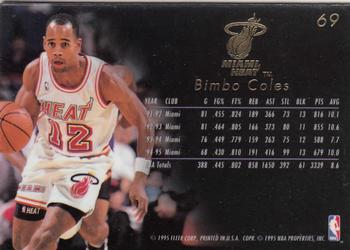
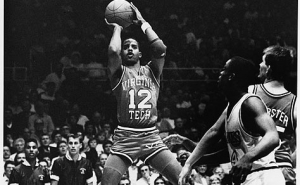
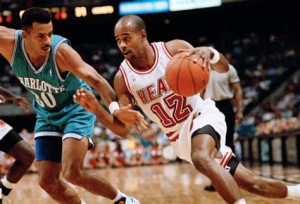
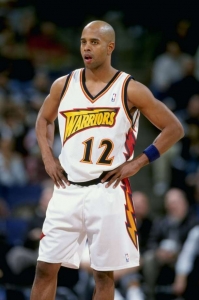
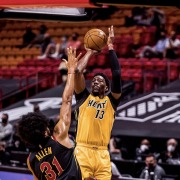
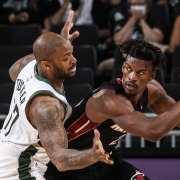
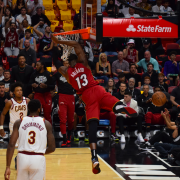 Alejandro Villegas
Alejandro Villegas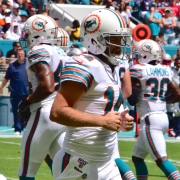
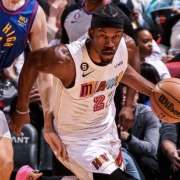
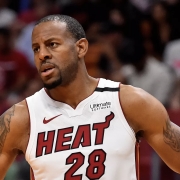


Leave a Reply
Want to join the discussion?Feel free to contribute!